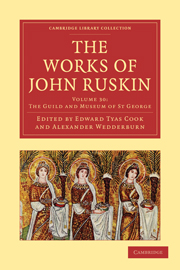Book contents
- Frontmatter
- Contents
- LIST OF ILLUSTRATIONS
- INTRODUCTION TO THIS VOLUME
- PART I THE GUILD OF ST. GEORGE
- PART II THE ST. GEORGE'S MUSEUM
- APPENDIX
- BIBLIOGRAPHICAL NOTE
- 1 LETTERS RELATING TO THE AFFAIRS OF THE ST. GEORGE'S GUILD (1875–1884)
- II LETTERS AND REPORTS RELATING TO THE ST. GEORGE'S MUSEUM (1875–1890)
- III INDUSTRIAL EXPERIMENTS IN CONNEXION WITH ST. GEORGE'S GUILD
- IV RUSKIN'S MAY QUEENS
- V THE RUSKIN CABINET AT WHITELANDS COLLEGE
- VI RUSKIN AND THE BOOKSELLERS
- Plate section
VI - RUSKIN AND THE BOOKSELLERS
Published online by Cambridge University Press: 07 September 2011
- Frontmatter
- Contents
- LIST OF ILLUSTRATIONS
- INTRODUCTION TO THIS VOLUME
- PART I THE GUILD OF ST. GEORGE
- PART II THE ST. GEORGE'S MUSEUM
- APPENDIX
- BIBLIOGRAPHICAL NOTE
- 1 LETTERS RELATING TO THE AFFAIRS OF THE ST. GEORGE'S GUILD (1875–1884)
- II LETTERS AND REPORTS RELATING TO THE ST. GEORGE'S MUSEUM (1875–1890)
- III INDUSTRIAL EXPERIMENTS IN CONNEXION WITH ST. GEORGE'S GUILD
- IV RUSKIN'S MAY QUEENS
- V THE RUSKIN CABINET AT WHITELANDS COLLEGE
- VI RUSKIN AND THE BOOKSELLERS
- Plate section
Summary
It is a far cry from Paternoster Row to Sunnyside, at Orpington, where Ruskin's publishing was for many years exclusively, and is still in part, carried on. The noise and bustle of a great commercial establishment are exchanged for a quiet little family circle; and instead of the “city's central roar” you are surrounded by the hills of Kent. The system of business presents an even greater contrast. Other authors are content to grumble—individually or in incorporated societies—against the wiles of publishers and the tricks of trade. Ruskin shook himself free from the trammels, and established a publisher and bookseller of his own and on his own terms. This new method, described in Fors Clavigera, had been some fifteen years in operation when, in view of the ever-recurring controversy between authors and publishers, I sought an opportunity (writes the author of Studies in Ruskin) a year or two ago of learning how the plan is found to work. Mr. George Allen inquired for Mr. Ruskin's wishes in the matter, and Mr. Ruskin kindly authorised him to tell me “everything I cared to ask, and show me everything I cared to see.” The following, with such alterations only as have been necessary to bring the particulars up to date (1890), was the description, written at the time, of what is probably one of the most successful publishing businesses of the day:—to the Knockholt Beeches. On one of the walls there hangs, between some pencil drawings by Mr. Ruskin of his favourite Abbeville, a water-colour drawing of the view which Mr. Ruskin sees from his study window.
- Type
- Chapter
- Information
- The Works of John Ruskin , pp. 358 - 362Publisher: Cambridge University PressPrint publication year: 2010First published in: 1907



